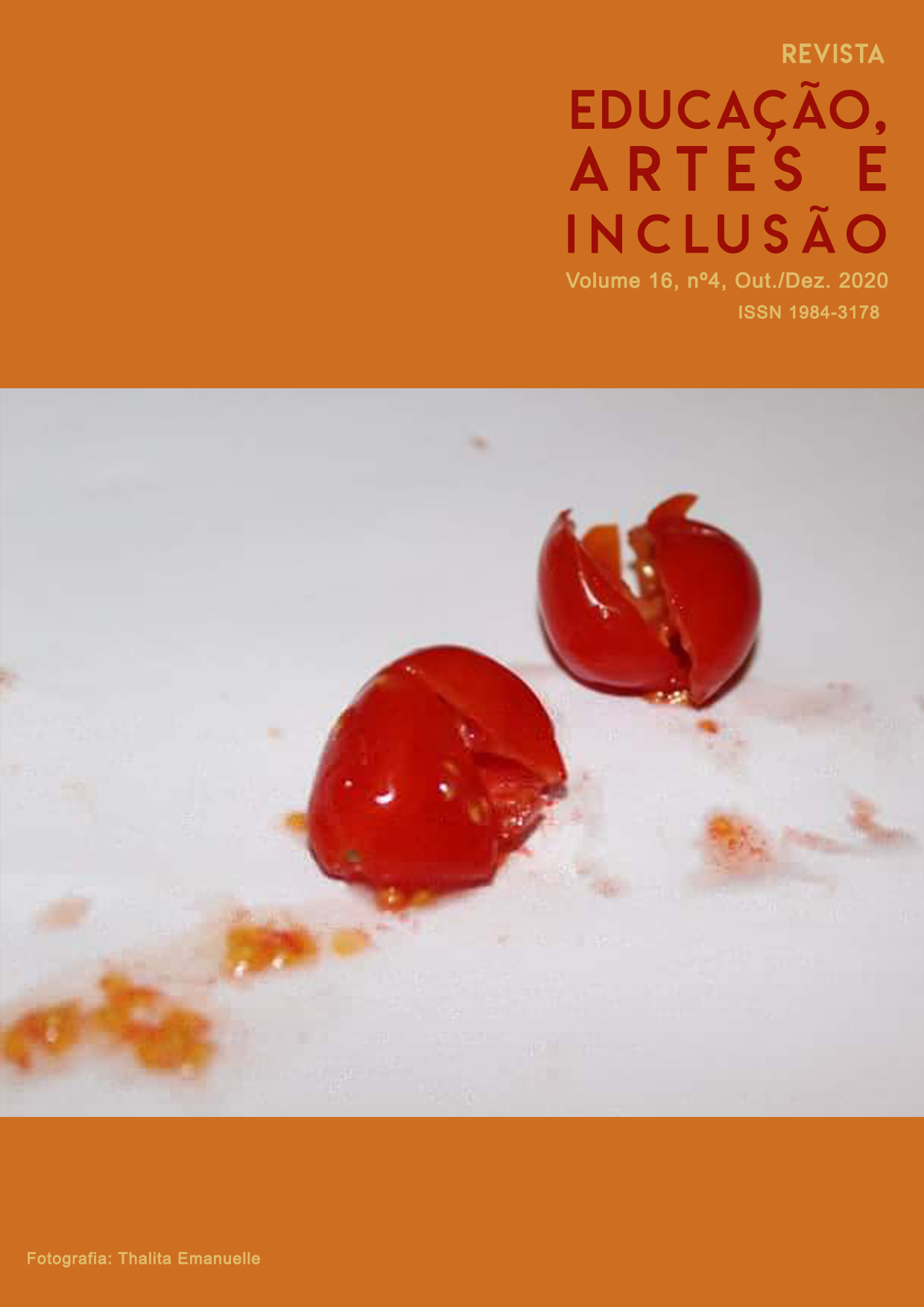Small displacements: body, art, health and education
DOI:
https://doi.org/10.5965/198431781642020196Keywords:
Arte, Mulheres, Território, Educação, SaúdeAbstract
This article intends to problematize the idea of small displacements that are experienced in the context of training practices that seek to compose other ways of thinking and acting in health, as a possibility to promote access to aesthetic experience and life in its expressive and creative power. To this end, we will present some aspects of a creation and education project that involves women from a vulnerable region of Santos, who present different physical, emotional and social challenges, and students from a public university. In this project, different proposals were made mobilized by the arts in their multiple languages, in order to promote sensitive and playful experiences that can produce small displacements. quicken bodies, activate memories, imaginations, recognize and awaken desires, affect and be affected by the encounter between bodies. We consider small displacements as minor movements within experiences, which have the power to activate and affect processes of subjectivation and the production of other sensitivities. We experimented dancing, singing, playing, dramatizing, moving and pausing, talking and silencing, among other things, attentive to what is small, the microscopic marks, to the details of events. Anchored in a micropolitical perspective, we bet on small interferences as a way of producing inventive training for students and the increase of individual and collective power with all and all participants of this collaborative project that takes place at the interface of body, art, health and education.
Downloads
References
BUTLER, J. O capitalismo tem seus limites. In: AMADEO, P. (org.) Sopa de Wuhan: pensamiento contemporáneo en tiempos de pandemias. Madrid, Editorial ASPO, 2020.
CASETTO, S. J.; HENZ, A. O.; GARCIA, M. L.; AGUIAR, F. B.; MONTENEGRO, J. T.; UNZUETA, L. B.; CAPOZZOLO, A. A. A good training based on insufficiency: Work in health care as an ethics. Journal of Health Psychology, v. 21, p. 291-301, 2016. Disponível em: https://doi.org/10.1177/1359105316628747. Acesso em: 26 abr. 2020.
COMITÊ INVISÍVEL. Aos nossos amigos. São Paulo: Ed. n-1, 2016.
DELEUZE, G. Conversações. São Paulo: Ed. 34, 2000.
GIL, J. A imagem nua e as pequenas percepções. Lisboa: Relógio D'Água, 1996.
GUATTARI, F. Caosmose. São Paulo: Ed. 34, 1992.
GOULART, P. M.; PEZZATO, L. M.; JUNQUEIRA, V. Experiências narrativas: um relato de formação em saúde. Linhas Críticas, Brasília, v.24, p.237-254, 2018. Disponível em: https://doi.org/10.26512/lc.v24i0.18978. Acesso em: 26 abr. 2020
GUZZO, M.S.L.; LIBERMAN, F.; GONÇALVEZ, N.; TONON, L.M.; MAXIMINO, V.S. FEDERICI, C.A.G. Parangolés: inspiração para dançar no território. Interface. v. 22(67), pp.1287-98, 2018. Disponível em: https://doi.org/10.1590/1807-57622017.0987
KASTRUP, V. Um mergulho na experiência: uma política para a formação dos profissionais da saúde In: CAPOZZOLO, A. A.; CASETTO, S. J.; HENZ, A. O. (org.). Clínica Comum: itinerários de uma formação em saúde. São Paulo: Hucitec, 2013. pp.151-162.
LAPOUJADE, D. As existências mínimas. São Paulo: Editora n-1, 2017.
LIBERMAN, F.; FEDERICI, C.; GUZZO, M. Projeto sonhos: um processo de criação com mulheres em situações de vulnerabilidade in: CRUZ, C.; CRUZ, H.; BEZELGA, I.; FALCÃO, M.; AGUIAR, R. (org.). A busca do comum: práticas artísticas para outros futuros. Porto, Portugal: Instituto de Investigação em Arte, Design e Sociedade (i2ADS), 2019. Disponível em: https://dspace.uevora.pt/rdpc/bitstream/10174/27842/1/ABuscaDoComum_baixa.pdf Acesso em: 4 mai. 2020.
KRENAK, A. Ideias para adiar o fim do mundo. São Paulo: Cia das Letras, 2019.
MANNING, E. The minor gesture. Durham, EUA: Duke University Press. 2016. Disponível em: https://doi.org/10.1215/9780822374411. Acesso em: 26 abr. 2020
MANNING, E. Proposições para um movimento menor. Moringa - Artes do Espetáculo, João Pessoa, v. 10, n. 2, pp. 11-24, dez. 2019.
MBEMBE, A. O direito universal à respiração. São Paulo: Editora n-1, 2020.
OITICICA, H. Carta 1969. In: FIGUEIREDO, L. (org.). Cartas 1964-74: Lygia Clark e Hélio Oiticica. Rio de Janeiro: Ed. UFRJ, 1998.
PELBART, P. P. Vida Capital: ensaios de biopolítica. São Paulo: Iluminuras, 2003.
RYNGAERT, J.-P. Jogar, representar. São Paulo: Cosac Naify, 2009.
ROLNIK, S. A hora da micropolítica. São Paulo: Editora n-1, 2016.
TEIXEIRA, R. As dimensões da produção do comum e a saúde. Saúde Soc., v. 24, supl.1, pp.27-43, 2015. Disponível em: http://dx.doi.org/10.1590/S0104-12902015S01003. Acesso em: 26 abr. 2020
Downloads
Published
How to Cite
Issue
Section
License
Copyright (c) 2020 Flavia Liberman Caldas, Marina Souza Lobo Guzzo, Elizabeth Maria Freire de Araújo Lima

This work is licensed under a Creative Commons Attribution-NonCommercial 4.0 International License.
Copyright Statement
The Educação, Artes e Inclusão is a journal that follows the Free Access Policy. The articles published by the journal are free of charge, intended for educational and non-commercial applications. The articles whose authors are identified represent the expression from the point of view of their authors and not the official position of the Educação, Artes e Inclusão Journal or the Educação, Artes e Inclusão Research Group.
Authors who publish in this journal agree to the following terms:
(A) Authors retain the copyright and grant the journal the right of first publication, with the work simultaneously licensed under the Creative Commons Attribution License which allows the sharing of the work with acknowledgment of authorship and initial publication in this magazine.
(B) Authors are authorized to take additional contracts separately, for non-exclusive distribution of the version of the work published in this journal (eg publish in institutional repository or as a book chapter), with acknowledgment of authorship and initial publication in this magazine.
(C) This journal provides public access to all of its content, as this allows for greater visibility and scope of published articles and reviews. For more information on this approach, visit the Public Knowledge Project.
This journal is licensed under a Creative Commons Attribution-NonCommercial-ShareAlike 4.0 International License. This license allows others to remix, adapt and create from your work for non-commercial purposes, and although new work must give you due credit and cannot be used for business purposes, users do not have to license such derivative works under the same terms.



